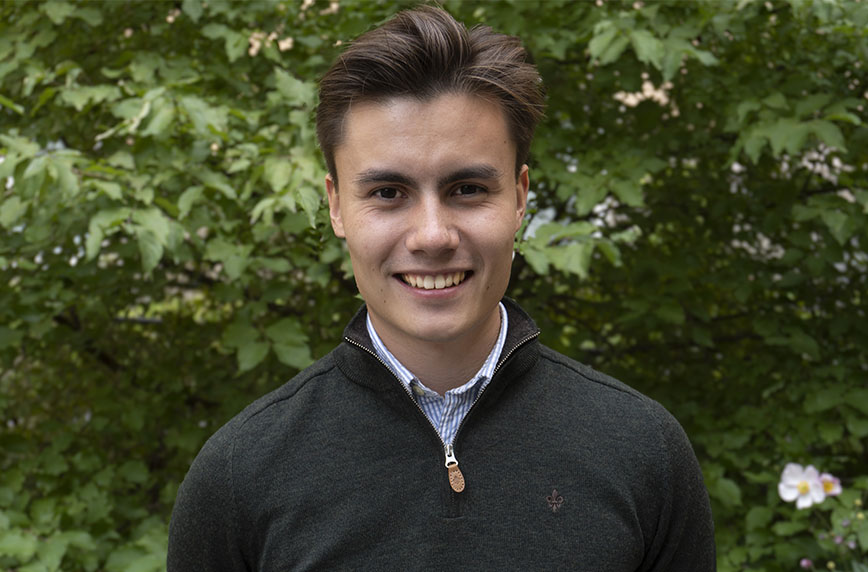André
André is from Oslo, Norway. His background consists of a bachelor’s degree within Civil and Structural Engineering from the University of Agder (UiA) in southern Norway. Besides the university, he is a very active person, and he has played pretty much any sport, including a ball that you could imagine.

Why did you choose this master’s programme at KTH?
For me, the reason for choosing this programme dates all the way back to my upper secondary school studies. Since I had the opportunity to choose specific elective courses at this stage, I uncovered my interests in both natural sciences and economics in courses such as physics and financial management, respectively. I, therefore, applied for one of the only programmes in Norway that combined these two fields called Industrial Economics and Technology Management. This programme had a so-called “3+2 structure”, meaning that I would follow an engineering discipline the first three years before spending the last two years studying the Industrial Management part.
Now, after three years, I decided to challenge myself, both by studying at a more renowned university and by moving abroad (granted that I come from a place that is closer to Stockholm than some Swedes do) while still remaining in a field of study that would combine technology with a more holistic perspective, including economics and management. My search then began for finding such a programme at such a university, and when I found the Industrial Management programme at KTH, the decision to apply was easy. It was exactly the programme I wanted to study, in a city with all the aspects I love from home, and one of Europe’s best technical universities, all at the same time.
What are the best aspects of your programme?
The best aspect of the programme is, in my opinion, the freedom and flexibility we get in choosing our elective courses. Since there is no real specialisation track within the programme, we are allowed to choose between pretty much any elective course that is offered at KTH and even some courses at, or in collaboration with, other universities. In that sense, everyone can choose and tailor their own “specialisation” to fit their specific interests. I have an extra interest in finance and the energy sector, so I have chosen elective courses within these subjects. However, others have taken courses within entrepreneurship, supply chain, innovation, and running your own company to mention a few of the opportunities.
How do studies at KTH differ from your previous studies?
The first and most obvious difference for me is that in an international master’s programme all of the education is in English. I see this as an important asset, seeing as the graduates from this programme are very likely to use English as their main working language.
Secondly, the academic year at KTH is split into four periods rather than two semesters, which also means that there are four examination periods, with courses being shorter but more intense. This allows for a larger focus on a few courses in each period rather than having one lecture a week over half a year, and then all the exams bunched up.
Lastly, the most significant academic difference for me is that (most) courses mainly use academic research papers as the curriculum as opposed to the traditional textbooks. This allows the contents of the course to be updated year-by-year as new research appears and ensures that the content is relevant for the time it is being taught.
How would you describe your time at KTH so far?
Being a student that started in the autumn of 2020, my time at KTH has been quite influenced by restrictions incurred by the covid-19 pandemic. From the academic perspective, KTH and the lecturers have adapted very well to the virtual learning environment. I feel the learning has been equally as good as if the lectures would have been held physically with the added benefit of being able to watch the lectures from wherever you are.
The social life is the part I feel has been most affected, seeing as the goal of the restrictions is to meet fewer people. However, due to the smaller size of the class, you will all get to know each other very well.
Furthermore, Stockholm is a city where the opportunities are endless. With undisturbed nature, a beautiful archipelago and a more classic city centre just being a couple of minutes away from each other there is always something to do.
What do you want to do after graduating?
After graduating from the Industrial Management programme, the opportunities are, in my opinion, endless, seeing as the skills acquired to apply to such a broad range of tasks. Everything from finance to brand management or production engineering are examples of what could be possible. Along with many others that study this programme, I want to work within several of these areas and further develop my knowledge and skills while simultaneously figuring out if there might be some parts I like better than others. My current plan for the future is, therefore, to work within management consulting after graduating.

